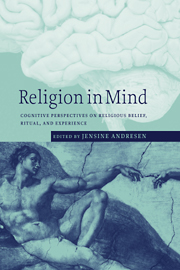Book contents
- Frontmatter
- Contents
- Notes on contributors
- 1 Introduction: towards a cognitive science of religion
- PART I BELIEF ACQUISITION AND THE SPREAD OF RELIGIOUS REPRESENTATIONS
- PART II QUESTIONING THE “REPRESENTATION” OF RELIGIOUS RITUAL ACTION
- 5 Ritual, memory and emotion: comparing two cognitive hypotheses
- 6 Psychological perspectives on agency
- 7 Do children experience God as adults do?
- PART III EMBODIED MODELS OF RELIGION
- Index
5 - Ritual, memory and emotion: comparing two cognitive hypotheses
Published online by Cambridge University Press: 02 December 2009
- Frontmatter
- Contents
- Notes on contributors
- 1 Introduction: towards a cognitive science of religion
- PART I BELIEF ACQUISITION AND THE SPREAD OF RELIGIOUS REPRESENTATIONS
- PART II QUESTIONING THE “REPRESENTATION” OF RELIGIOUS RITUAL ACTION
- 5 Ritual, memory and emotion: comparing two cognitive hypotheses
- 6 Psychological perspectives on agency
- 7 Do children experience God as adults do?
- PART III EMBODIED MODELS OF RELIGION
- Index
Summary
Without systems of public, external symbols for recording information, nonliterate communities have to rely on human memory for the retention and transmission of cultural knowledge. Religious expressions either evolved in directions that rendered them memorable or they were – quite literally – forgotten. Most religious systems, including all of the great world religions, emerged among populations that were mostly illiterate (even if there was a literate elite). Thus, it should come as no surprise that religious systems and ritual systems, in particular, have evolved so as to exploit variables that facilitate memory. The empirical evidence suggests that the invention of literacy may sometimes ameliorate these variables' influence; however, the availability of such cultural tools neither eliminates that influence nor even surmounts it. The cognitive dynamics at stake are not only pervasive, they are also far older and far more fundamental to the persistence of religion than these comparatively recent cultural overlays. The rituals of the literate exhibit the same patterns and general trends as those of the nonliterate.
Experimental psychologists have clarified variables that contribute to extraordinary recall for events that arise in the normal course of life. Probably, the most obvious is frequency. Experiencing events of the same type frequently aids memory for that type of event, though not necessarily for the details of any of the particular instances of that type. When Jains carry out the Pūja ritual day after day, they become adept at its performance. Although they are fluent with the ritual's details, it is possible that they do not remember even one of their previous performances distinctively.
- Type
- Chapter
- Information
- Religion in MindCognitive Perspectives on Religious Belief, Ritual, and Experience, pp. 115 - 140Publisher: Cambridge University PressPrint publication year: 2001
- 16
- Cited by



